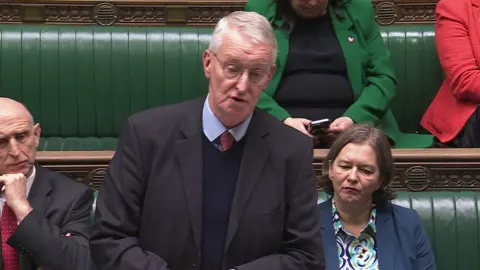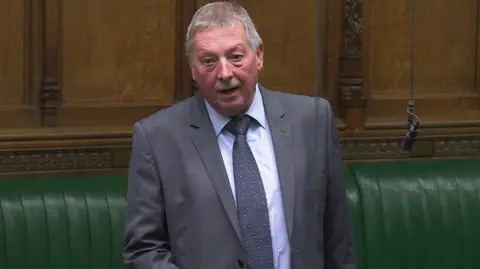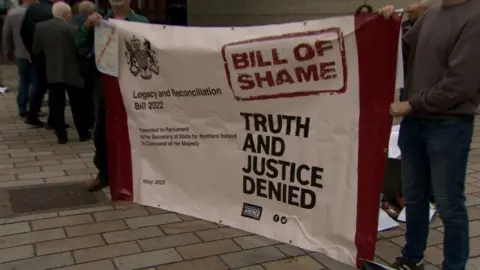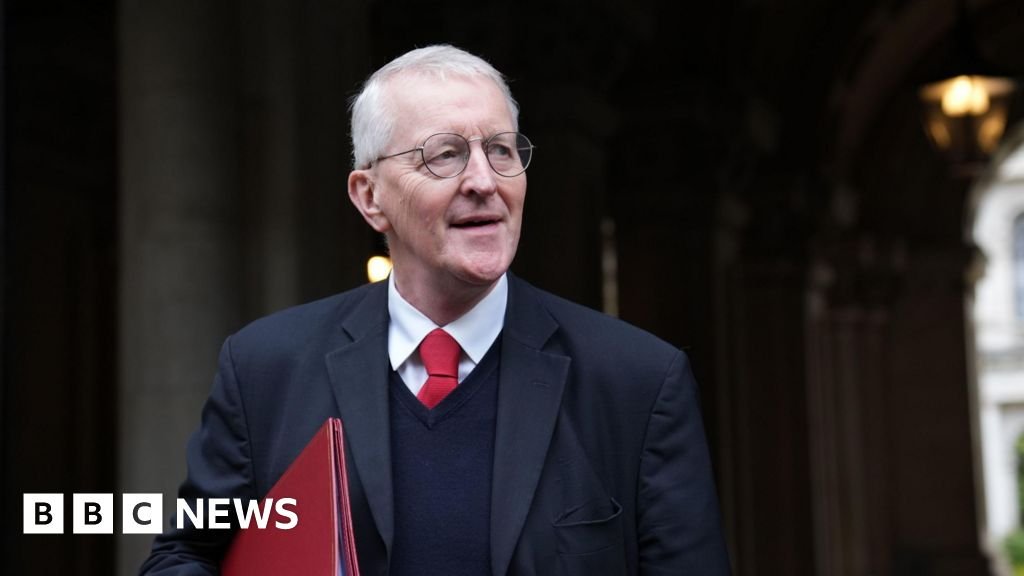 PA Media
PA MediaThe secretary of state for Northern Ireland has begun the process of formally repealing the controversial Legacy Act.
The act, which was brought in by the Conservative government, introduced a ban on inquests and civil actions related to incidents during the Troubles.
It also sought to offer a conditional amnesty for people suspected of Troubles-related crimes in exchange for co-operating with a new information recovery body.
Labour pledged to repeal the Legacy Act if they won the general election in July.
The Act has been opposed by victims’ groups and all the main political parties in Northern Ireland.
Speaking in the House of Commons, Hilary Benn said he was laying a “remedial order” which would formally remove the conditional immunity clause from the Act and the ban on new civil actions.
 Houses of Parliament
Houses of ParliamentBenn said he would also introduce legislation which would lift the ban on inquests.
“The steps I am outlining today seek to correct the mistakes of the previous government’s approach, ensure compliance with the ECHR and deliver on what this government has promised.
“The removal of conditional immunity, the reinstatement of legacy inquests halted by the act, restoring civil cases and reforming ICRIR (Independent Commission for Reconciliation and Information Recovery, while enabling it to continue working on behalf of the growing number of families who have already sought its help.”
A number of victims’ groups have called for the Independent ICRIR to be scrapped.
Benn indicated the Commission would continue operating, and that he would bring forward legislation in response to recent court judgements to ensure it complied with human rights law.
Legal challenge
He said the government would legally challenge some aspects of a Court of Appeal judgement from earlier this year – including a ruling relating to the government’s veto power over the disclosure of sensitive information by the Commission to bereaved families.
‘Reform and strengthen’
Benn said the government “will make further changes to reform and strengthen” the ICRIR’s “independence, powers and accountability.”
“I will now undertake further discussions on specific measures to be included in primary legislation, so that together with the remedial order the government fulfils its commitment to repeal and replace the Legacy Act.
“This will include families, victims and survivors groups, Northern Ireland parties, civil society and the veterans community, recognising the dedicated service of the vast majority of police officers, members of the armed forces and the security services who did so much to keep the people of Northern Ireland safe during the Troubles.”
‘Security forces dragged through courts’
 Houses of Parliament
Houses of ParliamentSpeaking in the House of Commons, DUP MP Sammy Wilson said the decisions the secretary of state had made on inquests and civil cases would “not result in terrorists being taken through the courts”.
“It is only going to result in aging members of the security forces being dragged, once again, through the courts and suffering as a result of the service that they gave in Northern Ireland,” he added.
‘Outrageous and disgraceful’
Sinn Féin MP John Finucane said the announcement by the secretary of state falls short of Labour’s manifesto commitment to “repeal and replace” the act.
Finucane called a number of Benn’s proposals “outrageous and disgraceful.”
“His main focus is on retaining and reforming the ICRIR in a vain bid to attract the support of families and victims rather than dealing with their genuine and well-rehearsed concerns,” Finucane added.
‘Many challenges remain’
SDLP MP Claire Hanna MP said her party welcomed the statement, specifically the “removal of the immunity scheme, the reinstatement of civil cases and the restoration of those legacy inquests halted.”
However she added that challenges remain and “failing to deal with the past properly limits our ability to have a different and shared future”.
What is the Northern Ireland Troubles (Legacy and Reconciliation) Act?
 Getty Images
Getty ImagesThe act was the government’s controversial attempt to “draw a line” under the Troubles in Northern Ireland.
It was first proposed by the then prime minister Boris Johnson in 2021 as a solution to ending what he called “vexatious prosecutions” of former soldiers.
It was passed in 2023.
It created a new legacy body known ICRIR to take over all Troubles-era cases from 1 May 2024, including those on the desk of the Police Service of Northern Ireland.
The act shuts down all historical inquests.
The act’s most controversial element, the offer of conditional immunity to suspects, has been disapplied following legal action by bereaved families.
The court ruled this part of the act was incompatible with human rights’ legislation and the Windsor Framework.
In late July, the Labour government wrote to the Belfast courts abandoning an appeal against the striking out of the amnesty clause in the legislation.
Victims’ opposition

There was widespread opposition to the Legacy Act.
Several victims’ groups; all of Northern Ireland’s political parties, the Labour Party and the Irish government criticised it from the start.
They argued that it denies justice to the bereaved and the injured.

